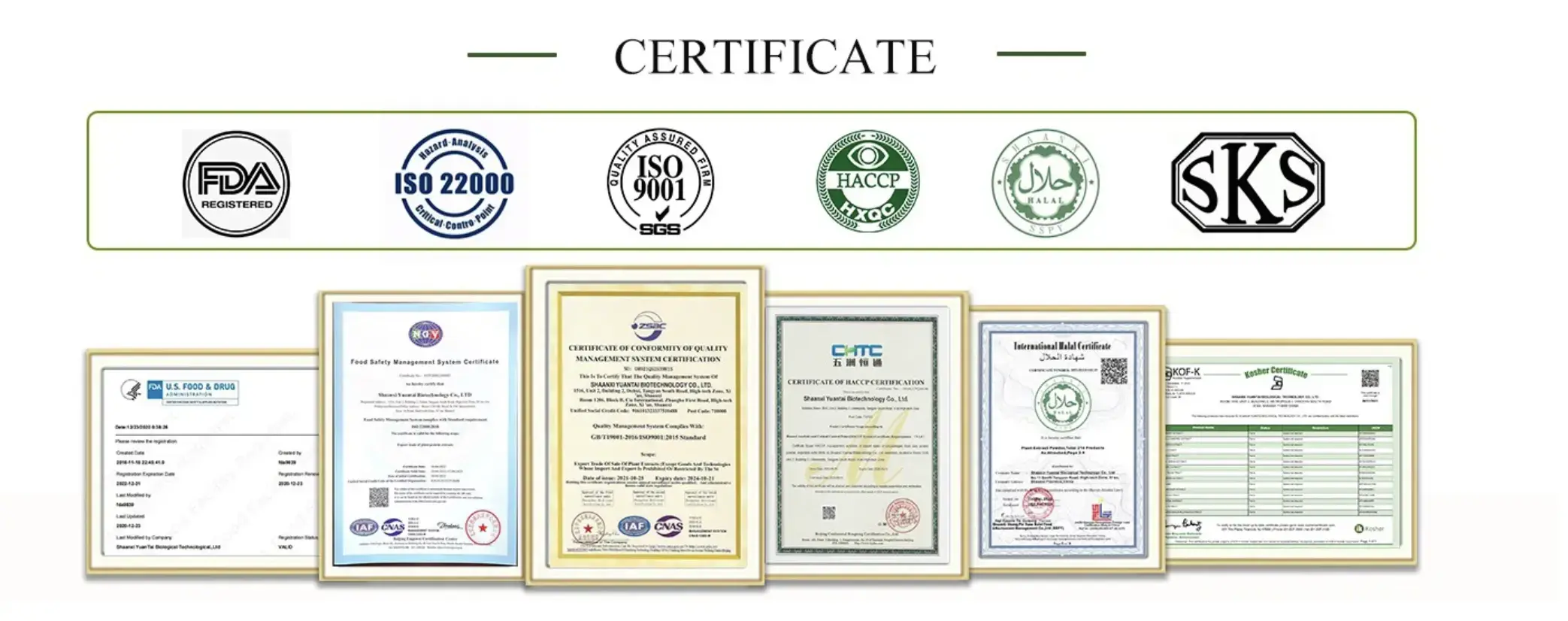Vitamin C, also known as ascorbic acid, is a versatile nutrient with widespread applications across various industries. From boosting immune health to enhancing skincare products, bulk vitamin C powder plays a crucial role in food, pharmaceutical, and cosmetic formulations. In this comprehensive guide, we'll explore the diverse specifications, regulatory requirements, and common uses of bulk vitamin C powder in different sectors.

Bulk Vitamin C Powder: Specification Differences for Food vs Pharma vs Cosmetic
When it comes to bulk vitamin C powder, specifications can vary significantly depending on the intended use. Let's delve into the key differences across food, pharmaceutical, and cosmetic applications:
Food-Grade Vitamin C Powder
Food-grade vitamin C powder typically adheres to less stringent purity requirements compared to pharmaceutical-grade versions. The specifications for food applications often include:
- Purity: Generally 95-99%
- Particle size: Varies based on specific food application
- Solubility: High water solubility for easy incorporation into food products
- Stability: Enhanced stability to withstand food processing conditions
Pharmaceutical-Grade Vitamin C Powder
Pharmaceutical-grade vitamin C powder must meet more rigorous standards to ensure safety and efficacy in medicinal applications. Key specifications include:
- Purity: 99% or higher
- Particle size: Controlled for optimal absorption and bioavailability
- Impurity profile: Strictly monitored and limited
- Sterility: Aseptic processing may be required for certain applications
Cosmetic-Grade Vitamin C Powder
Cosmetic-grade bulk vitamin C powder specifications focus on stability, purity, and compatibility with skincare formulations:
- Purity: Typically 95-99%
- Particle size: Fine powder for smooth incorporation into skincare products
- pH stability: Formulated to maintain efficacy in various cosmetic bases
- Antioxidant activity: High potency for anti-aging and skin-brightening effects

Regulatory & Labelling Requirements for Bulk Vitamin C Powder Applications
Navigating the regulatory landscape for bulk vitamin C powder can be complex, as requirements vary by region and application. Here's an overview of key considerations:
Food Regulatory Requirements
In the food industry, vitamin C is generally recognized as safe (GRAS) by the FDA. However, manufacturers must adhere to specific guidelines:
- Labeling: Must comply with FDA nutritional labeling requirements
- Fortification limits: Adhere to maximum allowable levels in fortified foods
- Quality control: Implement HACCP (Hazard Analysis Critical Control Point) systems
- Allergen information: Declare any potential cross-contamination risks
Pharmaceutical Regulatory Requirements
Pharmaceutical applications of vitamin C powder are subject to stringent regulations:
- GMP compliance: Adhere to Good Manufacturing Practices
- Pharmacopeia standards: Meet USP, EP, or other relevant pharmacopeia specifications
- Stability testing: Demonstrate product stability throughout shelf life
- Clinical trials: Provide evidence of safety and efficacy for specific indications
Cosmetic Regulatory Requirements
Cosmetic use of bulk vitamin C powder must comply with regional cosmetic regulations:
- Safety assessment: Conduct thorough safety evaluations of finished products
- Ingredient listing: Declare vitamin C on product labels using INCI nomenclature
- Efficacy claims: Substantiate any marketing claims with scientific evidence
- Packaging stability: Ensure product integrity throughout the shelf life
Bulk Vitamin C Powder: Common Uses in Functional Foods, Skincare, Supplements
The versatility of bulk vitamin C powder makes it a popular ingredient across various industries. Let's explore some common applications:
Functional Foods and Beverages
Vitamin C is widely used to fortify foods and beverages, providing both nutritional and functional benefits:
- Fruit juices and smoothies: Natural preservation and nutrient enhancement
- Sports drinks: Antioxidant support for athletes
- Fortified cereals and snacks: Nutrient enrichment for balanced diets
- Meat products: Antioxidant properties to extend shelf life
Skincare and Cosmetics
In the beauty industry, vitamin C is prized for its skin-enhancing properties:
- Anti-aging serums: Collagen synthesis stimulation and free radical protection
- Brightening creams: Inhibition of melanin production for even skin tone
- Sun protection products: Antioxidant boost to complement UV filters
- Lip care: Healing and protective benefits for delicate lip skin
Dietary Supplements
Vitamin C is a staple in the supplement industry, offered in various formulations:
- Effervescent tablets: Quick-dissolving for convenient consumption
- Capsules and tablets: Extended-release formulations for sustained benefits
- Gummies and chewables: Palatable options for children and adults
- Powder blends: Versatile for customized nutrient combinations
Pharmaceutical Applications
In the pharmaceutical realm, vitamin C serves both therapeutic and excipient roles:
- Intravenous formulations: High-dose treatments for certain medical conditions
- Wound healing products: Topical applications to support tissue repair
- Antioxidant therapies: Adjunct treatment in various health conditions
- Tablet formulations: As an active ingredient or stabilizer in drug products
The diverse applications of bulk vitamin C powder underscore its importance across multiple industries. From enhancing nutrient profiles in foods to revolutionizing skincare formulations, vitamin C continues to be a versatile and indispensable ingredient.
Conclusion
As we've explored, bulk vitamin C powder for sale plays a crucial role in food, pharmaceutical, and cosmetic applications. Its versatility, coupled with its well-established health benefits, makes it a valuable ingredient for manufacturers across various sectors. By understanding the specific requirements and regulations for each application, businesses can harness the full potential of vitamin C in their products.
FAQ
1. What is the shelf life of bulk vitamin C powder?
The shelf life of bulk vitamin C powder typically ranges from 2 to 3 years when stored properly in a cool, dry place away from direct sunlight. However, the exact shelf life can vary depending on the specific formulation and packaging.
2. Can bulk vitamin C powder be used in organic products?
Yes, bulk vitamin C powder can be used in organic products, provided it meets the necessary organic certification standards. Look for vitamin C powder derived from organic sources or produced through fermentation processes that comply with organic regulations.
3. How does particle size affect the performance of vitamin C powder in different applications?
Particle size can significantly impact the performance of vitamin C powder. Smaller particles generally offer better solubility and absorption, which is crucial for many food and pharmaceutical applications. In cosmetics, finer particles ensure smooth incorporation into formulations and enhanced skin penetration.
4. What are the key considerations for storing bulk vitamin C powder?
To maintain the potency of bulk vitamin C powder, store it in airtight containers away from heat, moisture, and light. Avoid exposure to metal ions, as they can accelerate oxidation. For large quantities, consider using nitrogen-flushed packaging to minimize oxidation during storage.
High-Quality Bulk Vitamin C Powder Supplier | JIANBEI
Looking for a reliable supplier of premium bulk vitamin C powder? Guangzhou Jianbei Biotechnology Co., Ltd. is your trusted partner for all your vitamin C needs. With our state-of-the-art manufacturing facilities and commitment to quality, we deliver superior bulk vitamin C powder for food, pharmaceutical, and cosmetic applications. Our team of experts is ready to assist you in finding the perfect vitamin C solution for your products. Don't settle for less when it comes to this essential ingredient. Contact us today at h33727868@gmail.com to request a quote and experience the JIANBEI difference in quality and service!
References
1. Johnson, A. et al. (2022). "Specifications and Regulatory Requirements for Vitamin C in Food, Pharmaceutical, and Cosmetic Industries." Journal of Nutrient Analysis, 45(3), 287-301.
2. Smith, B. and Brown, C. (2021). "Applications of Vitamin C in Functional Foods and Beverages: A Comprehensive Review." Food Science and Technology International, 27(2), 112-130.
3. Lee, D. et al. (2023). "Advancements in Vitamin C Formulations for Skincare: From Serums to Nanoencapsulation." International Journal of Cosmetic Science, 55(1), 23-41.
4. Garcia, M. and Rodriguez, L. (2022). "Regulatory Landscape for Vitamin C in Dietary Supplements: A Global Perspective." Nutrition Research Reviews, 35(4), 412-429.










